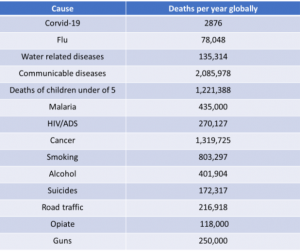“The Chinese use two brush strokes to write the word ‘crisis.’ One brush stroke stands for danger: the other for opportunity. In a crisis, be aware of the danger—but recognize the opportunity.” John F. Kennedy
Over the past week, global stock markets experienced the most severe 5‐day market correction in history. As news of the global spread of Covid‐19 intensified, fears of a global pandemic increased. The three major US market indices, the Dow Jones Industrial Average, the NASDAQ composite, and the S&P 500 fell more than 10% from the record market peaks achieved a few weeks ago. In 5 short days, the markets went from the euphoria of record highs to extreme fear. In our 2020 market outlook presentation, we examined the most recent work by Dr. Robert F. Shiller “Narrative Economics: How Stories go Viral and Drive Major Economic Events”. Recent events provide a case study on these concepts, with short‐term emotional reactions based on the belief that Covid‐19 virus will have major long‐term economic and societal consequences, affecting real economic decisions. With computers, not people, now driving the majority of trading volumes through algorithms, and ETFs and other products providing instant liquidity while the underlying assets are less liquid, we should expect to experience many more of these intense drawdowns in the future and plan accordingly. To put things into perspective, according to Bloomberg on February 28th, the ETF that mirrors the S&P 500 traded over $104 billion, a record day. This past Thursday the TSX shut down due to extreme levels of volume. Is the Covid‐19 situation serious? Yes. Is it the end of the world? No. Currently, travel restrictions to China remain in place, best practices are being developed, and assets are being mobilized to test and monitor patients. The public is being educated and officials are becoming more transparent. As the situation is quickly unfolding, more questions than answers remain:
1. Will global growth be hurt in the short term?
Yes, the global economy will experience a short-term supply and demand shock, however, the magnitude is uncertain and dependent on how people and policies react.
2. Will the spread of the virus continue? Yes.
3. Should we expect more deaths from the virus? Yes.
4. What will be the long‐term effects on the global economy? Too soon to tell. However, China’s policymakers have flooded their economy with liquidity. Will western Central Bankers follow their move? Our belief is they will act if needed.
5. Will global supply chains shift out of China? Too soon to tell.
6. What if this becomes a long‐term event? This is not our base case, but we also keep an open mind and will adjust our view accordingly.
The following provide perspective by examining the relative mortality impact, and how equity markets have performed historically in the 1‐year period after a major negative news item and resulting market correction.
Covid‐19 Deaths to Date vs Major Mortality Factors

Data from World Population Review, World O Meter, World Health Organization and UNICEF.
One Year US Index Returns Following Negative Events

One Year US Index Returns Following Past Epidemics

The Virus vs. Reaction to the Virus
Trying to predict the emotional reaction to global events is very difficult, in the short term, it is all about psychology and how we make decisions. Advances in neuroscience now suggest that over 99% of our decision making is controlled by our subconscious narratives and emotion. Our two prime emotions of fear and greed continually cloud our conscious decision making. The 24‐hour news cycle keeps a steady stream of negative highlights affecting our short‐term emotional interpretation of the unfolding events.
Disasters have a tendency of not happening. To be clear, for many in Wall Street, history is what happened 15 minutes ago. To wit, investors should realize that the newsletter writing industry is based on the end of the world being just around the corner. To be clear, investors should expect a 10% correction every year, and when it happens, those pundits will be rolled out in the media. This time is no different. In a secular bull market, we should expect significant and intense pullbacks. Once the Covid‐19 virus is brought under control, the global economy will continue to expand. This is not the beginning of a new secular bear market.
The term “keep calm and carry on” were the words of Sir Arthur Newsholme, Britain’s chief medical officer, used to calm citizens during the Spanish Flu pandemic in 1918, which killed tens of millions of people. How did the stock market do in that crisis? It went sideways. Is that event in history a perfect analogy? No. But we investors should heed the tagline that got so many through that serious global event. As we become more informed, as policymakers implement best practices to contain Covid‐19, the stock market should slowly recover. In the short term, the stock market is a voting machine reflecting short‐term emotions and bias. In the long term, the stock market is a weighting machine influenced by the fundamentals of the global economy. President Kennedy’s words may very well be prophetic and coupled with the words of Sir Arthur, suggest that investors should “keep calm and carry on” and take advantage of the opportunities the current crisis will present us. Working with an investment advisor to review individual plans and investment goals in the context of the current market environment can support
investors in doing so.

